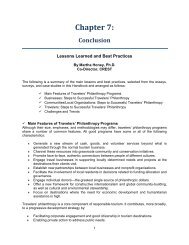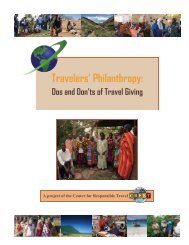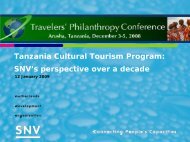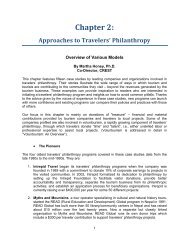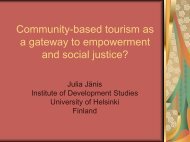Travelers' Philanthropy Handbook - Center for Responsible Travel
Travelers' Philanthropy Handbook - Center for Responsible Travel
Travelers' Philanthropy Handbook - Center for Responsible Travel
You also want an ePaper? Increase the reach of your titles
YUMPU automatically turns print PDFs into web optimized ePapers that Google loves.
culture and language; the latter knows these things intimately “from the inside.” The <strong>for</strong>mer ison “my side of the line” in terms of race, language, and social and economic class. The latteris on the other side of the line in all these respects.A third option is to leave the money with an organization with close ties to the village. Thismight be the Village Council, the Local Government Council, or a grassroots NGO (nongovernmentalorganization).For a variety of reasons, I am likely to leave the money with the lodge owner or the touroperating company. In other words, the money will exchange hands nationally but not culturallyand racially. For one thing, I may believe that other white people are not going to steal from mebut that non-whites might do so. That’s a residue of racism that, even in my own liberal heart, isstill there. I feel I can trust certain kinds of people – “my kinds of people” – while I should bewary of people different in important ways from me.But this view need not be dismissed as simple racism. There is an aspect, as economists willpoint out, of incentives and leverage. If an ecolodge tour owner or a tour operator misuses themoney, I have leverage over them. I can spread the word to my friends that these guys areuntrustworthy; don’t give them the business when they visit that country. If I leave the moneywith local people, however, this leverage is gone. There’s nothing I can do if someone fromthat group runs off with the money.Moreover, the quick negotiations carried out be<strong>for</strong>e I leave tomorrow morning are likely to takeplace over drinks in the tour lodge after sundown. The lodge owner comes over and says, “Ihear you guys want to do something to help the local people.” And I say, “That’s right. Sitdown and have a drink.” And so we get together in the most com<strong>for</strong>table and congenial ofsettings. I’ve just had an exhilarating day chasing wild animals. The sun has just set in a blazeof glory. We’re drinking Chivas Regal. We laugh and look each other in the eyes and makethe deal. This is what happens all the time in the real world: people are more likely to makedeals when the circumstances are physically and socially com<strong>for</strong>table.Now imagine the alternative of trying topass the money and responsibility overto someone who is local and doesn’tspeak my language. This person maynot have even been in the lodge exceptbeing brought there some time ago <strong>for</strong>symbolic or feel-good purposes. He(the individual is almost certainly goingto be a “he”) doesn’t understand howdeals are made within a racial group andsocial class to which he doesn’t belong.So I’m very unlikely to turn cash andresponsibility over to him. This isn’tbecause any of us – the lodge owner,myself, the village chief – is a badperson.It’s because com<strong>for</strong>t levels in these situations are very different. And com<strong>for</strong>t levelscorrelate positively with levels of interpersonal trust.What about the third option: an organization rather than a person? That’s not likely because asa short-term visitor I won’t even know the organization exists unless the lodge owner mentions it186Emboreet Secondary School Construction, Tanzania.Credit: Safari Ventures




